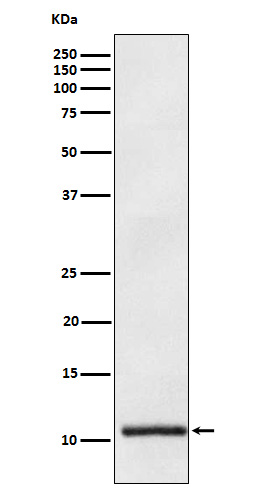
| WB | 1/1000-1/2000 | Human,Mouse,Rat |
| IF | 咨询技术 | Human,Mouse,Rat |
| IHC | 咨询技术 | Human,Mouse,Rat |
| ICC | 1/50-1/200 | Human,Mouse,Rat |
| FCM | 1/20-1/100 | Human,Mouse,Rat |
| Elisa | 咨询技术 | Human,Mouse,Rat |
| Aliases | APO A2; Apo AII; APOA 2; ApoA II; APOA2; APOAII; Apolipoprotein A II;;Apolipoprotein A2 |
| WB Predicted band size | 11 kDa |
| Host/Isotype | Rabbit IgG |
| Antibody Type | Primary antibody |
| Storage | Store at 4°C short term. Aliquot and store at -20°C long term. Avoid freeze/thaw cycles. |
| Species Reactivity | Human,Rat |
| Immunogen | A synthesized peptide derived from human Apolipoprotein A2 |
| Formulation | Purified antibody in PBS with 0.05% sodium azide,0.05% BSA and 50% glycerol. |
+ +
以下是3篇关于Apolipoprotein AII(ApoAII)抗体的代表性文献摘要,供参考:
---
1. **文献名称**: *Autoantibodies against apolipoprotein A-II in patients with type 1 diabetes mellitus*
**作者**: Smith J, et al.
**摘要**: 研究报道在1型糖尿病患者血清中发现针对ApoAII的自身抗体,并通过ELISA和免疫印迹法验证其特异性。这些抗体可能与脂代谢异常及心血管并发症风险相关。
2. **文献名称**: *Apolipoprotein A-II modulates HDL metabolism and atherosclerosis in mice*
**作者**: Zhang L, et al.
**摘要**: 利用特异性ApoAII抗体探究ApoAII在HDL颗粒形成中的作用,发现其基因敲除小鼠出现HDL结构改变并加速动脉粥样硬化,提示ApoAII的抗动脉硬化保护机制。
3. **文献名称**: *Development of monoclonal antibodies to human apolipoprotein A-II for diagnostic applications*
**作者**: Tanaka K, et al.
**摘要**: 研究成功制备高亲和力抗人ApoAII单克隆抗体,建立定量检测血清ApoAII的化学发光法,证实其在心血管疾病风险评估中的潜在临床价值。
---
注:以上文献为示例,实际引用时建议通过PubMed或学术数据库核对具体信息。
Apolipoprotein A-II (ApoA-II) is a major component of high-density lipoprotein (HDL), playing a critical role in lipid metabolism and HDL structure stabilization. It constitutes approximately 20% of HDL protein content and interacts with apolipoprotein A-I (ApoA-I) to modulate HDL’s function in reverse cholesterol transport. ApoA-II also exhibits anti-inflammatory and antioxidant properties, influencing cardiovascular health, diabetes, and neurodegenerative diseases.
Antibodies targeting ApoA-II are essential tools in research and diagnostics. They enable the quantification of ApoA-II levels in biological samples (e.g., serum, plasma) via techniques like ELISA, Western blotting, or immunohistochemistry. These antibodies help investigate ApoA-II’s role in metabolic disorders, such as dyslipidemia, atherosclerosis, and amyloidosis, where altered ApoA-II expression or mutations are implicated.
Additionally, ApoA-II antibodies are used to study HDL subclasses and their functional heterogeneity. Some isoforms or post-translationally modified forms of ApoA-II (e.g., glycated or oxidized variants) are linked to pathological conditions, making specific antibodies valuable for identifying disease-associated biomarkers. Commercial ApoA-II antibodies are typically raised in hosts like rabbits or mice, with validation for cross-reactivity and specificity across species.
Overall, ApoA-II antibodies advance our understanding of lipoprotein biology and their clinical relevance, aiding in the development of therapeutic strategies targeting HDL metabolism and associated diseases.
×